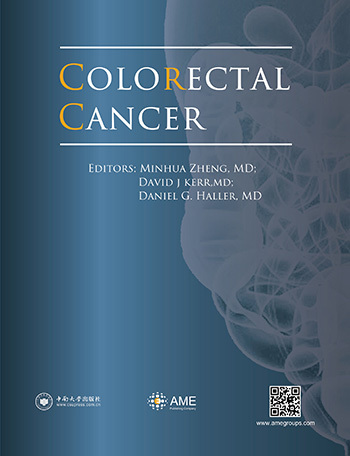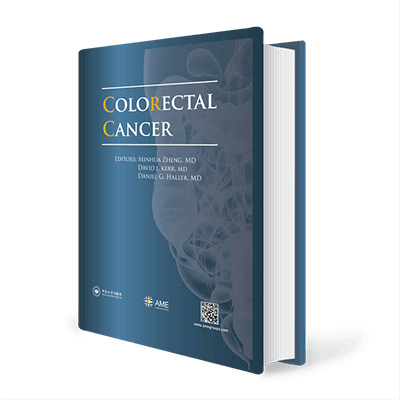
Colorectal Cancer
| Editors: | Minhua Zheng; David J. Kerr; Daniel G. Haller |
Publisher: AME Publishing Company; 1st edition (2016)
ISBN-13: 978-9881402790
Hardcover: 415 pages
Language: English
This book aims to provide an integrated and comprehensive approach to colorectal cancer control, delivered by internationally well known and respected authors who write with clarity and authority. It presents the peer reviewed work of an international cohort of preeminent authors, with a very broad view of the epidemiology, screening, surveillance, and therapeutic approaches to colorectal neoplasia.It will be of great interest and value to practicing physicians and surgeons, to cancer researchers, to students and trainees, and to an increasingly sophisticated lay audience.
Honorary Editors
| Jeffrey B. Matthews | Department of Surgery, the University of Chicago Medical Center, Chicago, IL 60637, USA |
| Russell I. Heigh | Division of Gastroenterology and Hepatology at Mayo Clinic, Scottsdale, AZ 85259, USA |
Editors
| Minhua Zheng | Ruijin Hospital, Shanghai Jiaotong University School of Medicine, Shanghai, China |
| David J. Kerr | Department of Clinical Pharmacology, University of Oxford, Oxford, UK |
| Daniel G. Haller | Abramson Cancer Center, Perelman School of Medicine at the University of Pennsylvania, Philadelphia, PA, USA |
Associate Editors
| Pan Chi | Union Hospital, Fujian Medical University, Fujian, China |
| Oliver M. Sieber | Systems Biology and Personalised Medicine Division, Walter and Eliza Hall Institute of Medical Research, Parkville, VIC, Australia; Faculty of Medicine, Dentistry and Health Sciences, Department of Medical Biology, University of Melbourne, Parkville, VIC, Australia |
| Yingjiang Ye | Peking University People’s Hospital, Beijing, China |
Table of Contents
Preface
Epidemiology and Screening of Colorectal Cancer
1 Epidemiology and burden of colorectal cancer in Asia-Pacific region: what shall we do now?
6 Improved colorectal cancer screening: a new option and opportunity
9 Colorectal cancer screening: are stool and blood based tests good enough?
16 Is the ability of stool DNA test enough for practical use in colorectal cancer screening?
19 Leptin as a risk factor for the development of colorectal cancer
31 Risk of colorectal cancer after detection and removal of adenomas at colonoscopy
Pathogenesis and Molecular Biology of Colorectal Cancer
33 The bacteria-hypothesis of colorectal cancer: pathogenetic and therapeutic implications
43 The evolution of colorectal cancer genetics—Part 1: from discovery to practice
Diagnosis of Lung Cancer
53 The evolution of colorectal cancer genetics—Part 2: clinical implications and applications
62 Genomic approach to translational studies in colorectal cancer
83 Extended RAS testing in metastatic colorectal cancer—Refining the predictive molecular biomarkers
91 TNF-α in obesity-associated colon cancer
Clinical Manifestations and Diagnostic Methods of Colorectal Cancer
106 Acromegaly and colorectal cancer
117 Evolution of imaging in rectal cancer: multimodality imaging with MDCT, MRI, and PET
Treatment of Colorectal Cancer
130 Current surgical considerations for colorectal cancer
139 Local excision for early rectal cancer: transanal endoscopic microsurgery and beyond
150 A critical review of the role of local excision in the treatment of early (T1 and T2) rectal tumors
158 Complete mesocolic excision with central vascular ligation: is this the approach to improve colon cancer surgery oncological outcomes?
162 Complete mesocolic excision (CME) with central vessel ligation (CVL): a new standard in colon cancer surgery
165 Is lymph node metastasis the only concern in high-risk submucosal colorectal cancer following endoscopic resection?
168 The emerging role of neoadjuvant chemotherapy for rectal cancer
180 Hyperthermic intraperitoneal chemotherapic perfusion in colorectal cancer
195 Preoperative chemotherapy for locally advanced resectable colon cancer - a new treatment paradigm in colon cancer?
200 Novel radiation techniques for rectal cancer
206 Evidence behind use of orthovolt intraoperative radiotherapy and other techniques of IORT in recurrent colorectal cancer treatment
213 Aspirin for colorectal cancer with PIK3CA mutations: the rising of the oldest targeted therapy?
215 Oral tyrosine kinase inhibitors targeting VEGF-receptors in patients with metastatic colorectal cancer
219 Targeted therapies in colorectal cancer: surgical considerations
228 Update on antiangiogenic therapy in colorectal cancer: aflibercept and regorafenib
236 Impact of the immune system and immunotherapy in colorectal cancer
252 Review of systemic therapies for locally advanced and metastatic rectal cancer
268 Therapeutic approaches in the management of locally advanced rectal cancer
277 Multidisciplinary approach and targeted agents increase resectability of liver-limited metastases from colorectal cancer
280 Predicting complete response: is there a role for non-operative management of rectal cancer?
286 Stage II colon cancer
Treatment of Postoperative Recurrence and Metastasis of Colorectal Cancer
292 Management of oligometastatic rectal cancer: is liver first?
299 Liver-directed therapies in metastatic colorectal cancer
313 Non-operative therapies for colorectal liver metastases
330 Regional hepatic therapies: an important component in the management of colorectal cancer liver metastases
341 Surgical treatment of colorectal liver metastases
350 The surgical treatment of patients with colorectal cancer and liver metastases in the setting of the “liver first” approach
356 Intraoperative margin re-resection for colorectal cancer liver metastases
361 Potential use of Doppler perfusion index in detection of occult liver metastases from colorectal cancer
Nursing and psychological problems of colorectal cancer
370 Addressing sexual dysfunction in colorectal cancer survivorship care
377 Diet and supplements and their impact on colorectal cancer
392 Psychosocial issues in colorectal cancer survivorship: the top ten questions patients may not be asking




